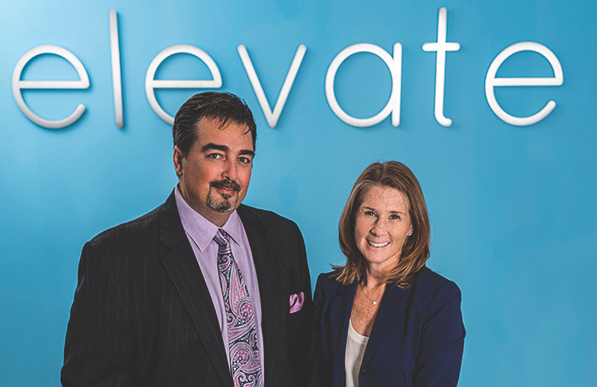
Industry veteran and longtime agency leader Frank X. Powers, Elevate Healthcare’s cofounder and managing partner, has witnessed how pharmaceutical, device and diagnostics companies have contended with the ebb and flow of marketing budgets over the years. “We live this every day with our clients,” he says, pointing to the mean budget figures in this year’s MM&M/Elevate Healthcare Marketers Trend Report. “The MM&M historical survey data proves that everybody is being asked to do more with less, and data shows it’s been trending that way for much of the last decade.”
What this year’s largely positive findings nonetheless suggest to him is that marketing partners can’t just assume continued upward momentum in budget sums. “In my mind, it translates to marketing teams being smarter with where their dollars go, and being more strategic and focused in their intent,” he says. “Despite the increase in some of the overall percentages, you have to look deeper. A one- or two-year upswing doesn’t quite signal a significant shift to an all-out spending spree.”
One area this comes into play: the budgets underwriting pharma’s traditional armies of sales reps. As the report suggests, the death of the pharma sales force has been greatly exaggerated: It remains the biggest investment made by many of the clients with which Elevate works. The numbers in the report vary by category, client or brand, but in most cases they are rising. A range of 34% to 60% of respondents reported increasing investment in sales reps.
Those investments need to be better informed by feedback not just from customers, but from the reps themselves, Powers says. “A big part of what we do is build programs to optimize the moment in front of a healthcare professional. We have to ensure that the selling tools are efficient and effective,” he explains.
Marketers creating for pharma’s sales forces must also mind the differences in company culture. Powers notes that explaining the rationale behind a brand’s creative and messaging isn’t a task that can be short-shifted. “We hear a lot about how the handoff between marketing and field sales isn’t as clean as it needs to be,” he says. “You have to ensure that’s done well to help a brand maximize its potential.”
Powers sees fewer such issues on the digital front. The data in this year’s report shows that marketers are shifting more resources toward patient- and consumer-facing selling tools, and that half of respondents say they have upped outlays for physicians and specialists. “The professional audience is more receptive to these tools,” Powers says. “We’ve helped the sales reps find the best way to use them. They work. That’s why budget increases are being allocated for them.”
At the same time, Powers adds that healthcare’s use of such tools and tactics with HCPs still continues to lag the consumer world, and the increased spending reflects that lower baseline. “Virtual reality is still in its early stages of adoption in medicine and in surgery, but we’re seeing strides.” Powers notes. “In both general and orthopedic surgical training, VR is having a real impact.”
He adds that AI, robotics and VR/AR have the promise to integrate the sheer amount of data and medical knowledge being generated through EMRs and other sources to provide intelligent solutions for HCP and their care teams. “These advanced tools provide both real-world evidence and outcome-based health in medicine and surgery, helping to focus on collaborative, personalized care. That is worth spending on,” Powers says.
Looking toward the remaining 10 months of 2020 and beyond, Elevate’s leadership team doesn’t see healthcare marketing budgets being significantly impacted by macro-economic trends or by major changes in reimbursement models. The respondents in the survey seem to agree. For all the talk about pharma’s supposed image problems and the skyrocketing price of certain “lightning rod” drugs, the industry — and thus its marketers — remains optimistic.
Even though there are now a permanent set of challenges to manage, Powers doesn’t expect the positive outlook to change, at least not in the near future. “At the core of things, we are educators,” he explains. “The need for that is certainly increasing.”
Powers adds that one of the industry’s core responsibilities will always be to help educate HCPs and patients about new therapies and technologies. “One of the most rewarding things we do is get new or critical medical information into the hands of professionals to help enhance the dialogue with their patients and improve outcomes as a result,” he says.
The investment in educating and promoting, he says, will continue to be there in the absence of seismic and sudden change. “With the current state of the economy, we are seeing more aggressive spending. The 2020 upward budget bump only reinforces that. In the HCP world, you’ll continue to see the investment grow in brand communication, product portfolio development and in sales forces to both maximize potential and to defend share against fierce competition.” Powers predicts.
“The key to it all is that now having gone through this up and down period where we’ve learned more than ever about how to optimize efficiencies and effectiveness, how to harness the power of new technology and to increase the ROI on sales force investment, we can carry these learnings forward as the 2020 upward budget bump makes increased spending on the right things possible and more realistic across the spectrum of most brands and portfolios.”
From the March 01, 2020 Issue of MM+M - Medical Marketing and Media







